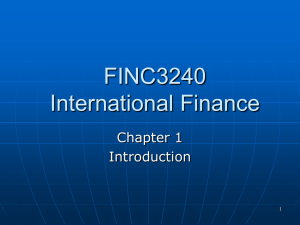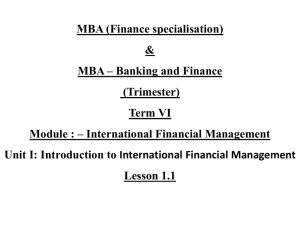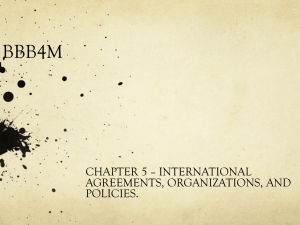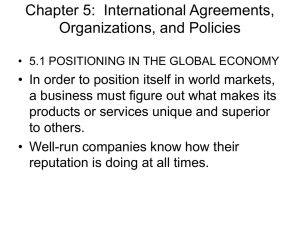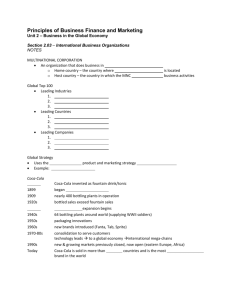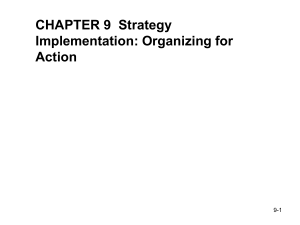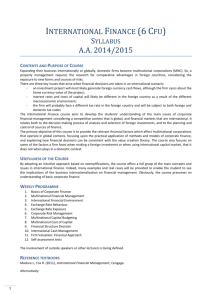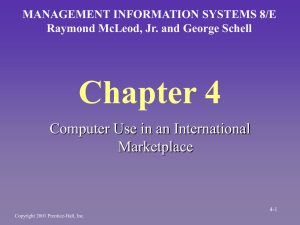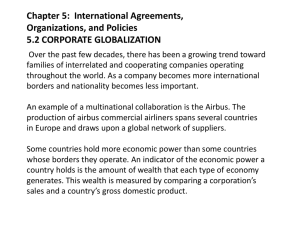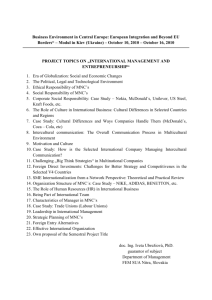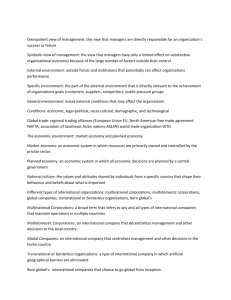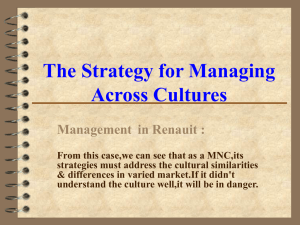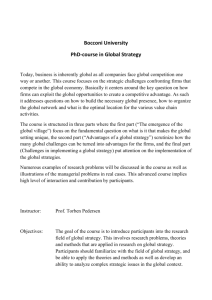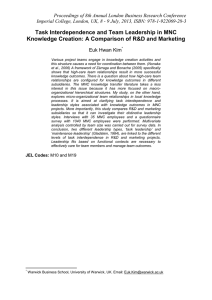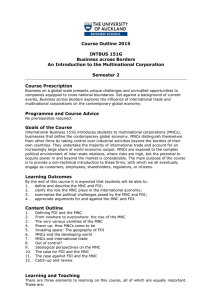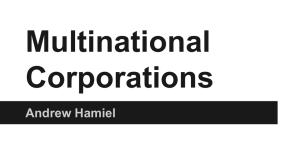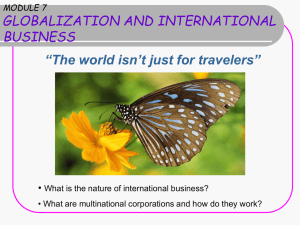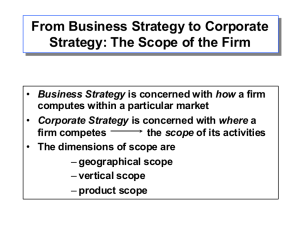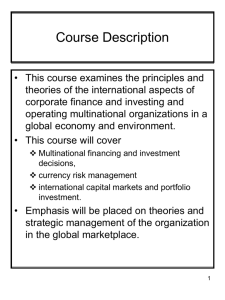BOH 4M – CHAPTER 5 NOTES - BOH4M
advertisement
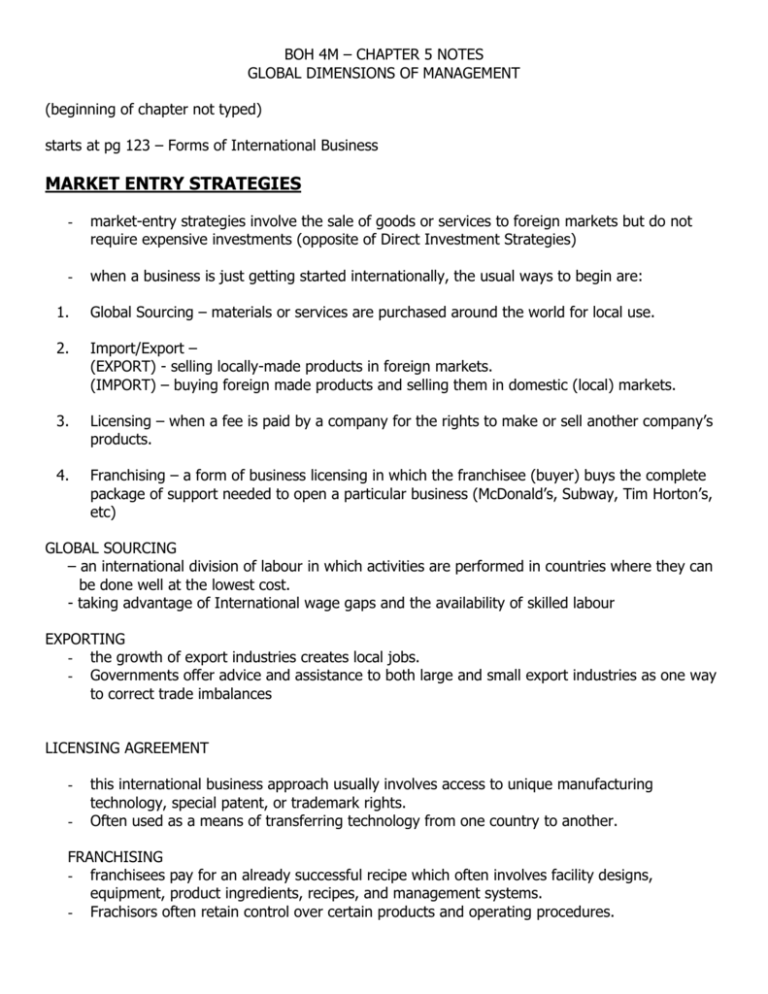
BOH 4M – CHAPTER 5 NOTES GLOBAL DIMENSIONS OF MANAGEMENT (beginning of chapter not typed) starts at pg 123 – Forms of International Business MARKET ENTRY STRATEGIES - market-entry strategies involve the sale of goods or services to foreign markets but do not require expensive investments (opposite of Direct Investment Strategies) - when a business is just getting started internationally, the usual ways to begin are: 1. Global Sourcing – materials or services are purchased around the world for local use. 2. Import/Export – (EXPORT) - selling locally-made products in foreign markets. (IMPORT) – buying foreign made products and selling them in domestic (local) markets. 3. Licensing – when a fee is paid by a company for the rights to make or sell another company’s products. 4. Franchising – a form of business licensing in which the franchisee (buyer) buys the complete package of support needed to open a particular business (McDonald’s, Subway, Tim Horton’s, etc) GLOBAL SOURCING – an international division of labour in which activities are performed in countries where they can be done well at the lowest cost. - taking advantage of International wage gaps and the availability of skilled labour EXPORTING - the growth of export industries creates local jobs. - Governments offer advice and assistance to both large and small export industries as one way to correct trade imbalances LICENSING AGREEMENT - this international business approach usually involves access to unique manufacturing technology, special patent, or trademark rights. Often used as a means of transferring technology from one country to another. FRANCHISING - franchisees pay for an already successful recipe which often involves facility designs, equipment, product ingredients, recipes, and management systems. - Frachisors often retain control over certain products and operating procedures. DIRECT INVESTMENT STRATEGIES - establishing a direct investment in a foreign country. JOINT VENTURES - many firms enter into co-ownership agreements that pool resources and share risks and control for business operations - International joint ventures are “strategic alliances” that help participants to gain things through cooperation that otherwise would be difficult to achieve independently. - In return for its investment in a local operation, for example, the outside or foreign partner often gains new markets and the assistance of a local partner who understands them. In return for its investment, the local partner often gains new technology as well as opportunities for its employees to learn new skills by working in joint operations. WHOLLY OWNED SUBSIDIARIES - this refers to a local operation that is completely owned and controlled by a foreign firm. - Like joint ventures, foreign subsidiaries may be formed through direct investment in startup operations, or through equity purchases in existing ones. MULTINATIONAL CORPORATIONS - - - - a multinational corporation is a business firm with extensive international operations in more than one foreign country. General Electric, Wal-Mart, and DaimlerChrysler are examples of premier global giants. Multinational organizations are similar in size and scope to MNC’s, but conduct their business in the non-profit sector. a transnational corporation is a MNC that operates worldwide on a borderless basis. Transnationals are not commonly identified as having one national home. Executives that run transnationals view the entire world as the domain for such business activities as: o Acquiring resources o Locating production facilities o Marketing goods and services o Brand imaging The goal of the transnational corporation is the total integration of global operations, make decisions from a global perspective, and operate across borders without a home-based prejudice. Multinational Corporations hold approximately 33% of the world’s productive assets, and control 70 % of world trade. PROS AND CONS OF MNC’s - While the presence of MNC’s is promising to business leaders, it can be very threatening to countries and their domestic industries. Both the global corporations and the countries that host their foreign operations should mutually benefit from any business relationships. Host country benefits include: o Larger tax bases o Increased employment opportunities - o Technology transfers o Development of local resources Host country costs include: o MNC’s extract excessive profits o Domination of the local economy o Interfere with the local government o Don’t respect the local customs and laws o Fail to help domestic firms develop ETHICAL ISSUES FOR MULTINATIONAL OPERATIONS PG 128
